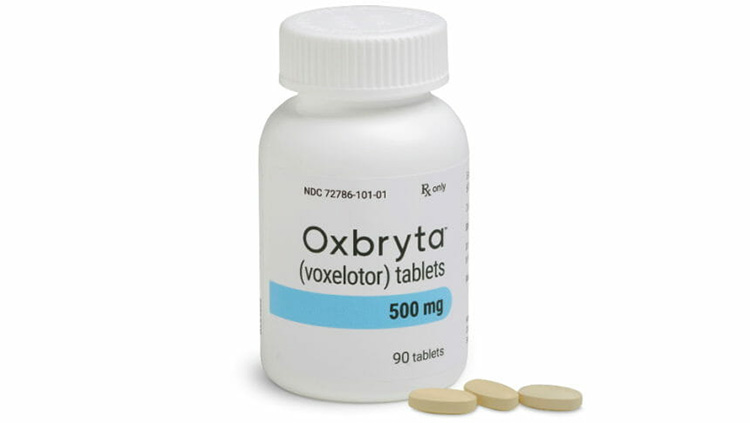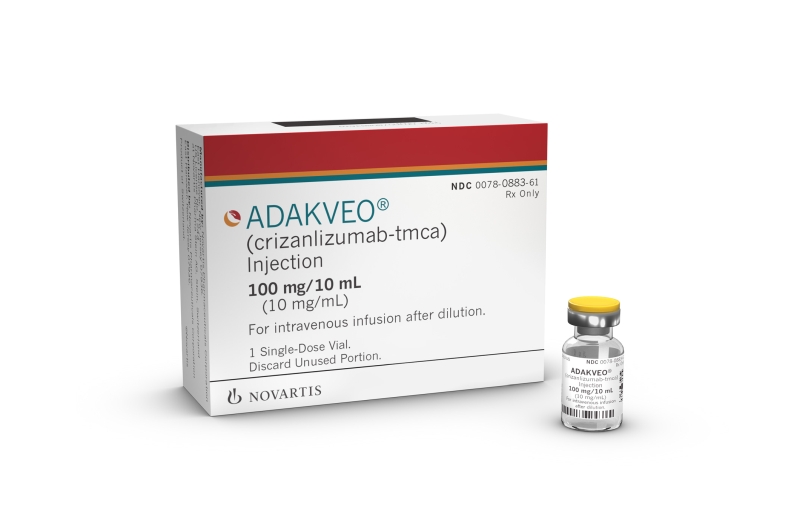Oxbryta (voxelotor) vs Adakveo (crizanlizumab)
Oxbryta (voxelotor) vs Adakveo (crizanlizumab)
Oxbryta (voxelotor) is an oral medication designed to increase hemoglobin's affinity for oxygen, thereby reducing the sickling of red blood cells in patients with sickle cell disease, which can lead to fewer pain crises. Adakveo (crizanlizumab), on the other hand, is an intravenous medication that works by blocking P-selectin, a substance that contributes to the painful vaso-occlusive crises common in sickle cell disease. When deciding between the two, a patient should consider factors such as the mechanism of action, route of administration, dosing frequency, and individual response to treatment, in consultation with their healthcare provider.
Difference between Oxbryta and Adakveo
| Metric | Oxbryta (voxelotor) | Adakveo (crizanlizumab) |
|---|---|---|
| Generic name | Voxelotor | Crizanlizumab-tmca |
| Indications | Treatment of sickle cell disease | Prevention of vaso-occlusive crises in patients with sickle cell disease |
| Mechanism of action | Increases hemoglobin's affinity for oxygen | P-selectin inhibitor, which prevents cells from sticking together |
| Brand names | Oxbryta | Adakveo |
| Administrative route | Oral | Intravenous infusion |
| Side effects | Headache, diarrhea, abdominal pain, nausea, fatigue, rash, fever | Back pain, nausea, fever, arthralgia, and constipation |
| Contraindications | Hypersensitivity to voxelotor or excipients | Hypersensitivity to crizanlizumab-tmca or excipients |
| Drug class | Hemoglobin S polymerization inhibitor | P-selectin inhibitor |
| Manufacturer | Global Blood Therapeutics | Novartis Pharmaceuticals |
Efficacy
Oxbryta (Voxelotor) Efficacy in Sickle Cell Disease
Oxbryta (voxelotor) is a medication specifically approved for the treatment of sickle cell disease (SCD). It works by increasing the affinity of hemoglobin for oxygen, thus preventing hemoglobin polymerization, which is the primary cause of sickle cell formation. Clinical trials have demonstrated the efficacy of voxelotor in improving hemoglobin levels in patients with SCD. In a pivotal Phase 3 trial known as the HOPE study, patients treated with voxelotor experienced a significant increase in hemoglobin levels compared to those on a placebo. This improvement in hemoglobin is associated with a reduction in red blood cell destruction (hemolysis), a common complication in SCD that can lead to anemia and other systemic complications.
Moreover, voxelotor has shown a reduction in the incidence of vaso-occlusive crises (VOCs), which are acute, painful episodes caused by the obstruction of blood flow due to sickled red blood cells. While the primary endpoint of the HOPE study was the improvement of hemoglobin levels, secondary endpoints suggested that patients on voxelotor may experience fewer VOCs, indicating an added benefit of the drug in managing SCD-related complications. However, more extensive studies are required to conclusively determine the impact of voxelotor on VOC frequency and severity.
Adakveo (Crizanlizumab) Efficacy in Sickle Cell Disease
Adakveo (crizanlizumab) is another medication approved for the management of SCD. Crizanlizumab is a monoclonal antibody that targets P-selectin, a cell adhesion molecule involved in the interactions between sickled red blood cells, white blood cells, and the endothelium. By blocking P-selectin, crizanlizumab helps to prevent these cells from sticking together and obstructing blood vessels, which can trigger vaso-occlusive crises. The efficacy of crizanlizumab was demonstrated in the SUSTAIN study, a randomized, placebo-controlled trial. The results showed that patients receiving crizanlizumab had a significantly lower rate of VOCs compared to those receiving a placebo, with the higher dose of crizanlizumab achieving a 45% reduction in the annual rate of VOCs.
In addition to reducing the frequency of VOCs, crizanlizumab has been associated with a delay in the time to the first VOC in patients with SCD. This suggests that crizanlizumab may offer a preventative benefit in reducing the occurrence of these painful and potentially dangerous episodes. The SUSTAIN study also indicated that crizanlizumab was well-tolerated, with a safety profile comparable to that of the placebo group. While the primary focus of crizanlizumab's efficacy has been on the reduction of VOCs, ongoing research continues to evaluate its broader impact on SCD-related complications and quality of life for patients.
Regulatory Agency Approvals
Oxbryta
-
European Medical Agency (EMA), European Union

-
Food and Drug Administration (FDA), USA

Adakveo
-
European Medical Agency (EMA), European Union

-
Food and Drug Administration (FDA), USA

Access Oxbryta or Adakveo today
If Oxbryta or Adakveo are not approved or available in your country (e.g. due to supply issues), you can access them via Everyone.org.
How it works

Make an enquiry
Choose the medicine you want to buy, answer a couple of questions, and upload your prescription to speed things up. We’ll get back to you within 24 hours.


Make an enquiry
Choose the medicine you want to buy, answer a couple of questions, and upload your prescription to speed things up. We’ll get back to you within 24 hours.


Breeze through the paperwork
We'll guide you through the required documents for importing unapproved medicine, ensuring you have all the necessary information.


Get a personalized quote
We’ll prepare a quote for you, including medicine costs and any shipping, administrative, or import fees that may apply.


Receive your medicine
Accept the quote and we’ll handle the rest - sourcing and safely delivering your medicine.

Some text on this page has been automatically generated. Speak to your physician before you start a new treatment or medication.
Let's talk
If you have any questions, call us or send us a message through WhatsApp or email:
Contact us




